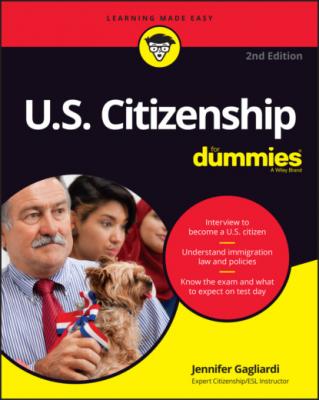ТОП просматриваемых книг сайта:
U.S. Citizenship For Dummies. Jennifer Gagliardi
Читать онлайн.Название U.S. Citizenship For Dummies
Год выпуска 0
isbn 9781119766896
Автор произведения Jennifer Gagliardi
Издательство John Wiley & Sons Limited
Notice how we keep saying “in most cases”? The previous explanation is current law, and it’s a generalization. Whether you acquired U.S. citizenship at birth depends on the law that was in effect at the time of your birth. This is one of the toughest areas of immigration law, filled with loopholes and exceptions, so getting expert help in these cases is always a good idea. Be sure to seek and get competent legal help before you need it. (You can get more information on finding legal help in Chapter 7.)
Entering the visa lottery is easy. You can file online at https://travel.state.gov/content/travel/en/us-visas/immigrate/diversity-visa-program-entry/diversity-visa-submit-entry1.html. Submitting more than one application disqualifies you from the lottery.
If you receive a visa through the Diversity Visa Lottery Program, you’ll be authorized to live and work permanently in the United States, as well as bring your husband or wife and any children under the age of 21 along with you.
Each year 50,000 immigrant visas become available to people who come from countries with low rates of immigration to the United States. The Department of State randomly selects about 100,000 applicants from among the qualified entries. Why do they pick 100,000 when only 50,000 visas are available? Because they know that not all the applicants will be able to successfully complete the visa process. When 50,000 applicants have qualified and completed the immigration process, no further Diversity Lottery visas are issued for that year.
Documenting Your Immigration Status
Your entry document (such as an I-94 card for nonimmigrants) or a green card (if you’re a permanent resident) serves as the important documentation you need to prove that you’re in the United States legally and that you’re entitled to all the rights and privileges that come with that status. As long as you hold a valid USCIS entry document or green card, are maintaining lawful status, and have not committed a removable offense, you don’t have to worry about being forced to leave the country. For naturalized citizens, a Certificate of Naturalization or a U.S. passport serves as the same proof of immigration status.
Depending on where you are in the immigration process, you’ll need various forms and documentation.
Just visiting
A nonimmigrant, or temporary, visa allows you to legally stay in the United States for a given length of time, after which you must leave the country. In order to qualify for a temporary visa, you’ll usually need to prove that you have a residence outside the United States, as well as binding ties to your home country, such as a family or a job. The U.S. government wants to be sure that you’ll return home at the end of your visit. In most cases, you’ll also need to show that you have enough money to support yourself while in the United States.
The type of temporary visa you get will depend on the reasons why you want to visit the United States. You can gain temporary access to the United States in many ways, including the following:
As a visitor or tourist
For business
To seek medical treatment
As a temporary worker or to receive work training
As a student, either for academic or vocational training
By participating in an educational or cultural exchange program
As a fiancé(e) of an American citizen
As a NAFTA professional
The profession is on the NAFTA list.
The person has the necessary skills and qualifications to fill the position.
The position requires someone in a professional capacity.
The person will be working for a U.S. employer.
Under this particular status, you will be allowed to bring your spouse and unmarried children under 21 with you, although they will not be allowed to work in the United States unless they qualify for work authorization on their own.
www.travel.state.gov/vwp.html) to see if your home country qualifies. See the full list of visa categories at https://travel.state.gov/content/travel/en/us-visas/visa-information-resources/all-visa-categories.html.
Here to stay
To become a lawful permanent resident, an alien must first be admitted as an immigrant. Most people get their immigrant visas because a qualified relative or employer has sponsored them as follows:
1 The employer or relative filed a petition with the USCIS.
2 The USCIS approved the petition and then forwarded it to the National Visa Center for further processing.
3 The State Department issued a visa after an immigrant visa number became available.
If you’re already living in the United States, you may be eligible to adjust your immigration status from temporary to lawful permanent resident without leaving the country. And here’s some good news: As an applicant, you may apply for a work permit while your case is pending. (You can find out more about this in Chapter 3.)
In most cases, as an alien applying for permanent residence, you will need to provide
A valid passport
Three photographs
Birth and police certificates
Marriage, divorce, or death certificates of your current and/or prior spouse(s)
Proof of financial support
Proof of medical examination

